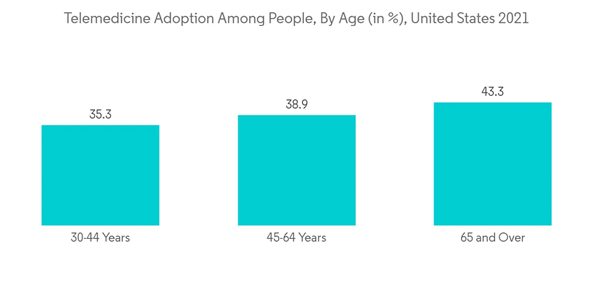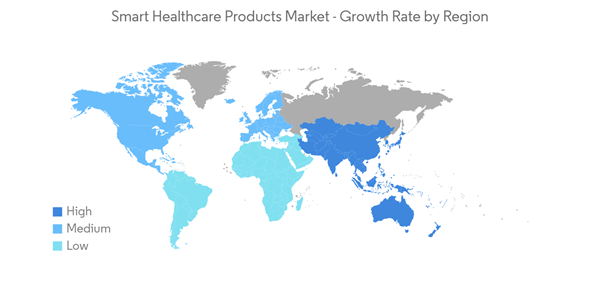With the emergence of COVID-19, smart healthcare products observed a sudden upsurge in demand. As a result, many companies are expanding their products and services. For instance, according to a study published in IEEE Access in January 2022, a smart health monitoring system was developed using Internet of Things (IoT) technology, which is capable of monitoring blood pressure, heart rate, oxygen level, and temperature of a person, thus helping manage COVID-19 patients. The demand for smart health products increased during the pandemic, which significantly influenced the market's growth. The market is also projected to expand in the following years due to an increase in the use of smart healthcare products to effectively monitor health outcomes, along with the development of technologically advanced products that encourage customers to purchase these devices.
Smart healthcare products are based on the new generation of information technologies, such as the internet of things (loT), big data, cloud computing, and artificial intelligence, to transform the traditional medical system and make healthcare more efficient, convenient, and personalized. Smart healthcare products are undergoing technological developments due to their increasing penetration in the healthcare market. Various initiatives by public and private players, such as product launches and approvals, are also driving the growth of the market. For instance, in January 2021, Apple Inc. partnered with Biogen, a biotechnology company, for a study on detecting the signs of cognitive impairment early through its wearable devices. Similarly, in November 2021, Honeywell launched the Real-Time Health Monitoring System (RTHMS), a smart edge-to-cloud communication platform that acts as a bridge between caregivers and patients for remote and real-time monitoring of patients. The solution combines hardware and software to improve care delivery, increase worker productivity, and streamline processes.
The growing adoption of IoT in healthcare is expected to boost the market. In healthcare, IoT applications benefit patients, families, physicians, hospitals, and insurance companies. According to the study published in Oral Biology and Craniofacial Research in April 2022, IoT is a developing technology that delivers enhancements and improved solutions in the medical area, such as proper medical record-keeping, sample, device integration, and illness causes. Sensor-based IoT technology has the potential to significantly minimize the risk of surgery in complex circumstances. Thus, such advantages are expected to raise the demand for IoT-based smart healthcare products, thereby boosting the growth of the market.
However, high cost of smart healthcare products may restrain the market over the forecast period.
Key Market Trends
The mHealth Segment is Expected to Observe Good Growth in the Market
mHealth is a component of eHealth. The National Institutes of Health (NIH) defined mHealth as the use of mobile and wireless devices that include cell phones, tablets, patient monitoring devices, and personal digital assistance (PDAs) to improve health outcomes, healthcare services, and health research. The segment is driven by a rise in the use of smartphones and tablets.A growing preference for mobile technology, the internet, and mounting demand for digital health is expected to boost the segment's growth. The launch of various programs with increased adoption of smart health is also supporting the market's growth. For instance, in August 2021, Athenahealth and Smile Foundation launched the Smile on Wheels mobile health unit in Chennai. Athenahealth is providing financial support to a Smile on Wheels mobile health unit, which will offer primary healthcare services in an area in Chennai with approximately 17,600 households and 88,000 residents. Smile on Wheels is a national-level mobile hospital program catering to underprivileged children and women. Such initiatives may increase the adoption of health and create awareness about health technology, thereby boosting the growth of the segment.
Product launches by the key market players are also expected to propel the growth of the segment. For instance, in September 2021, Mount Sinai Health System launched a comprehensive mobile application for patients called MyMountSinai. This app is an online gateway to Mount Sinai physicians and services, helping patients manage their medical information, communicate with their doctors, and get details on health services available at the Mount Sinai Health System.
Hence, the rising adoption of mHealth and product launches by market players are expected to boost the segment's growth, which may also augment the market's growth over the forecast period.
North America Holds a Significant Share in the Market and May Continue to do the Same during the Forecast Period
The smart healthcare product market is expected to grow in the North American region due to supportive government policies for the deployment of digital health and the accessibility of infrastructure with high digital literacy. The presence of key market participants, growing awareness about connected healthcare, high penetration of the internet and smartphones, and the usage of health-related apps are a few key factors responsible for the growth of the regional market. According to a study published in Nature Review Cardiology in August 2021, an estimated 20% of US residents currently own a smart wearable device to monitor their health. Thus, with the rising adoption of smart wearable devices in the country, the market is expected to grow over the forecast period.The continuous product launches with new advancements are boosting the growth of the market in the region. For instance, in April 2021, the American Health Information Management Association (AHIMA), together with Moxe, launched AHIMA dHealth, a mHealth resource and assessment tool for vendors. In March 2022, RespiraLabs, a respiratory healthcare tech business based in the United States, released Sylvee, an AI-powered wearable lung monitor that employs acoustic resonance to assess lung function and identify variations in lung air volume. It can aid in the early detection and treatment of chronic obstructive pulmonary disease (COPD), asthma, and COVID-19. Thus, the growing prevalence of chronic diseases and product launches are expected to boost the smart healthcare products market in the region over the forecast period.
Competitive Landscape
The smart healthcare products market is at a growing stage, and it is moderately competitive. Market players focus on new product launches, such as essential cardiology and blood glucose monitors. Smartwatches, health monitors, pedometers, and activity trackers are smart wearable devices launched by several companies. Companies are focusing on industry collaborations, mergers, acquisitions, and partnerships to enhance their presence in the smart healthcare products market. Some of the key players are Honeywell Life Care Solutions, AirStrip Technologies, and Olympus Corporation, among others.Additional benefits of purchasing the report:
- The market estimate (ME) sheet in Excel format
- 3 months of analyst support
This product will be delivered within 2 business days.
Table of Contents
Companies Mentioned (Partial List)
A selection of companies mentioned in this report includes, but is not limited to:
- Olympus Corporation
- Abbott Laboratories
- GE Healthcare
- Koninklijke Philips NV
- Samsung Healthcare
- Siemens Healthineers AG
- Oracle Corporation (Cerner Corporation)
- McKesson Corporation
- Next Gen Healthcare
- Medtronic (Given Imaging Inc.)
- Life Sense
- Capsule Technologies Inc.










